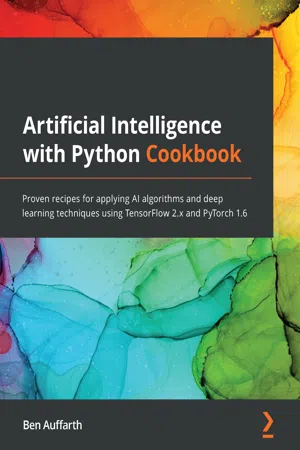
Artificial Intelligence with Python Cookbook
Proven recipes for applying AI algorithms and deep learning techniques using TensorFlow 2.x and PyTorch 1.6
Ben Auffarth
- 468 pagine
- English
- ePUB (disponibile sull'app)
- Disponibile su iOS e Android
Artificial Intelligence with Python Cookbook
Proven recipes for applying AI algorithms and deep learning techniques using TensorFlow 2.x and PyTorch 1.6
Ben Auffarth
Informazioni sul libro
Work through practical recipes to learn how to solve complex machine learning and deep learning problems using Python
Key Features
- Get up and running with artificial intelligence in no time using hands-on problem-solving recipes
- Explore popular Python libraries and tools to build AI solutions for images, text, sounds, and images
- Implement NLP, reinforcement learning, deep learning, GANs, Monte-Carlo tree search, and much more
Book Description
Artificial intelligence (AI) plays an integral role in automating problem-solving. This involves predicting and classifying data and training agents to execute tasks successfully. This book will teach you how to solve complex problems with the help of independent and insightful recipes ranging from the essentials to advanced methods that have just come out of research.
Artificial Intelligence with Python Cookbook starts by showing you how to set up your Python environment and taking you through the fundamentals of data exploration. Moving ahead, you'll be able to implement heuristic search techniques and genetic algorithms. In addition to this, you'll apply probabilistic models, constraint optimization, and reinforcement learning. As you advance through the book, you'll build deep learning models for text, images, video, and audio, and then delve into algorithmic bias, style transfer, music generation, and AI use cases in the healthcare and insurance industries. Throughout the book, you'll learn about a variety of tools for problem-solving and gain the knowledge needed to effectively approach complex problems.
By the end of this book on AI, you will have the skills you need to write AI and machine learning algorithms, test them, and deploy them for production.
What you will learn
- Implement data preprocessing steps and optimize model hyperparameters
- Delve into representational learning with adversarial autoencoders
- Use active learning, recommenders, knowledge embedding, and SAT solvers
- Get to grips with probabilistic modeling with TensorFlow probability
- Run object detection, text-to-speech conversion, and text and music generation
- Apply swarm algorithms, multi-agent systems, and graph networks
- Go from proof of concept to production by deploying models as microservices
- Understand how to use modern AI in practice
Who this book is for
This AI machine learning book is for Python developers, data scientists, machine learning engineers, and deep learning practitioners who want to learn how to build artificial intelligence solutions with easy-to-follow recipes. You'll also find this book useful if you're looking for state-of-the-art solutions to perform different machine learning tasks in various use cases. Basic working knowledge of the Python programming language and machine learning concepts will help you to work with code effectively in this book.
Domande frequenti
Informazioni
- Transforming data in scikit-learn
- Predicting house prices in PyTorch
- Live decisioning customer values
- Battling algorithmic bias
- Forecasting CO2 time series
Technical requirements
Transforming data in scikit-learn
- It contains 123 different features, of different types:
- Categorical
- Numerical
- Range features
- Some missing values
- Target imbalance
Getting ready
- OpenML to download the dataset
- openml_speed_dating_pipeline_steps to use our custom transformer
- imbalanced-learn to work with imbalanced classes
- shap to show us the importance of features
pip install -q openml openml_speed_dating_pipeline_steps==0.5.5 imbalanced_learn category_encoders shap
Indice dei contenuti
- Title Page
- Copyright and Credits
- About Packt
- Contributors
- Preface
- Getting Started with Artificial Intelligence in Python
- Advanced Topics in Supervised Machine Learning
- Patterns, Outliers, and Recommendations
- Probabilistic Modeling
- Heuristic Search Techniques and Logical Inference
- Deep Reinforcement Learning
- Advanced Image Applications
- Working with Moving Images
- Deep Learning in Audio and Speech
- Natural Language Processing
- Artificial Intelligence in Production
- Other Books You May Enjoy